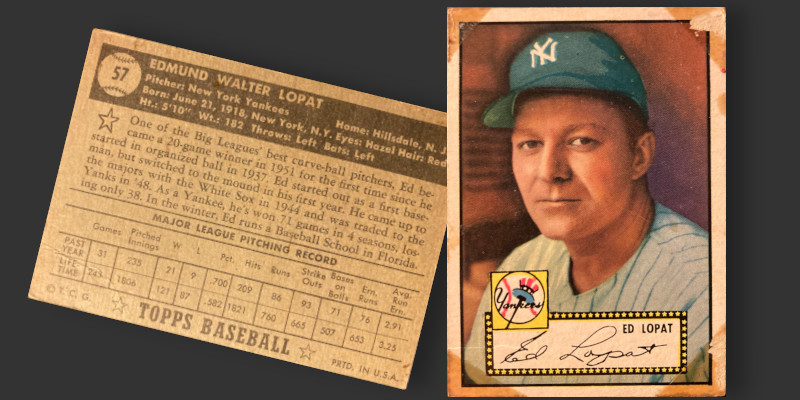Junk ball pitchers are a crafty bunch. They have a goal in mind but lack the firepower to go straight for it, electing instead to attack a batter with off speed pitches incorporating movement. Ed Lopat was one such pitcher, though he didn’t start out that way. Lopat tried out for the Yankees as a potential first baseman in 1936, but they already had some guy named Gehrig that never seemed to miss a game. The New York native switched to the outfield and found a low-level minor league slot with an affiliate of the Brooklyn Dodgers. Seven years later he was a starting pitcher in the majors.

Lopat gained prominence as one of the “Big 3” of the New York Yankees pitching staff during their run of five consecutive championships. He didn’t have much speed but was able to trick batters with a variety of breaking balls thrown at assorted speeds and arm angles. He bookended his appearance in the 1952 Topps set with an All-Star Game in 1951 and the American League ERA title in 1953 (2.46). He was already considered an old-timer when he appeared on this card but junk ball pitchers tend to do okay as they get older given little need to throw fastballs. By the time his career had concluded Lopat had accumulated a similar level of WAR and fielding independent pitching to that of Hall of Famer Bob Lemon.

Lopat’s Strangest Card
Ed Lopat’s strangest cardboard appearance came the year after his death. He appears as card #65 in the 1993 Ted Williams Card Company set. The card gets his name wrong on the back, identifying the Yankees pitcher as “Edwin” rather than Edmund. He is also portrayed in the full stride of batting, apparently watching a ball take flight. While he was an above average hitter for a pitcher, the card is ridiculous.

The Ted Williams Card Company was itself ridiculous. Named after the famous Boston slugger, the company was actually the work of his 25-year-old son who sought to take advantage of the era’s booming sports card market. All kinds of shady activity was alleged in connection with this venture, ranging from questions about how the firm was financed to accusations that it directly violated an existing contract for Ted to represent Upper Deck (itself no stranger to shenanigans).









